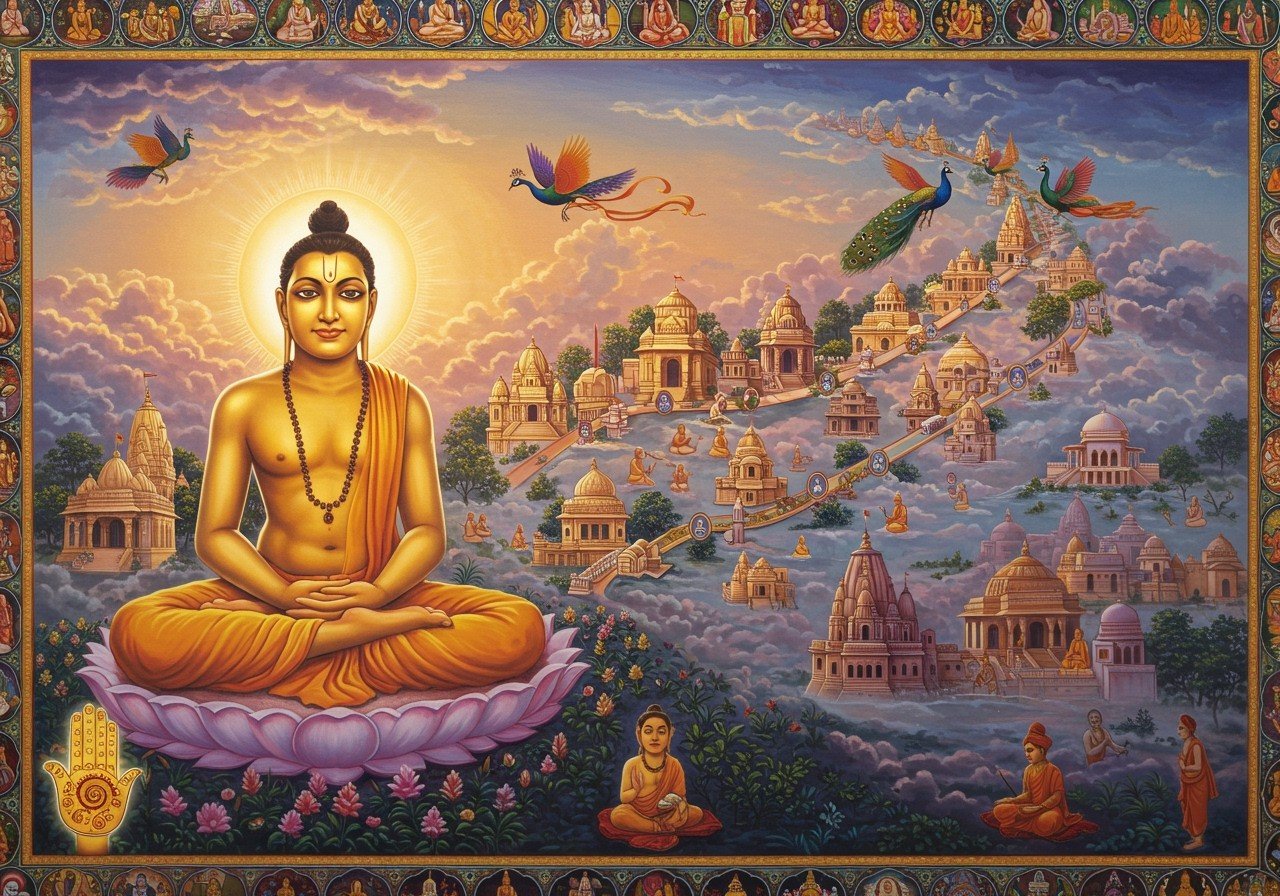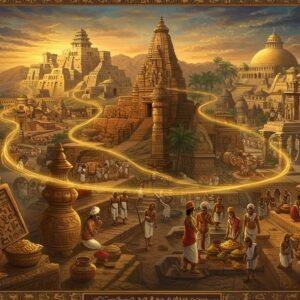
Jainism, an ancient Indian religion, emphasizes spiritual purity and enlightenment through disciplined non-violence (ahimsa) towards all living creatures. It traces its spiritual ideas through twenty-four Tirthankaras, with Mahavira being a significant figure around the 6th century BCE. Jainism flourished during the reign of King Chandragupta Maurya and received patronage from various dynasties, leading to the construction of iconic temples. The religion focuses on non-violence, simplicity, and self-discipline, with less emphasis on elaborate rituals, though certain practices are observed to express devotion and seek spiritual growth.
Origins of Jainism
Jainism’s roots lie in ancient India, predating the Vedic period and possibly connected to the Indus Valley Civilization. Key figures include Rishabhanatha, the first Tirthankara, and Mahavira, the 24th Tirthankara, who established Jainism as a distinct religion around the 6th century BCE.
Core Principles
- Ahimsa (Non-violence): This principle extends to all living beings, influencing dietary choices and daily actions.
- Satya (Truth): Honesty and truthfulness in thought, word, and deed are paramount in Jainism.
- Asteya (Non-stealing): Respect for others’ possessions and refraining from taking anything that isn’t freely given.
- Brahmacharya (Celibacy/Chastity): Control over sensual desires and maintaining purity of thought and action.
- Aparigraha (Non-possessiveness): Detachment from material possessions and a focus on spiritual growth.
The Jain scriptures, known as Agamas, preserve these core teachings and guide followers on their spiritual path. Explore related sacred texts at poojn.in.
Spread of Jainism
Jainism spread across India and beyond through the dedicated efforts of Jain monks who traveled and preached the teachings. Royal patronage from rulers like Chandragupta Maurya and dynasties like the Rashtrakutas and Chalukyas also played a vital role.
Major Jain Centers
- Gujarat: Home to important Jain pilgrimage sites like Palitana.
- Rajasthan: Known for Dilwara Temples, showcasing exquisite Jain architecture.
- Karnataka: Houses ancient Jain monuments and a significant Jain community.
- Tamil Nadu: Features historic Jain temples and a vibrant Jain presence. You can explore the significance of temples in this guide.
Jain scholars contributed significantly to literature, art, and architecture, enriching Indian culture. Trade routes and migration further facilitated the spread of Jainism to Southeast Asia.
Decline of Jainism in India
Despite its historical significance, Jainism faced a decline in India due to various factors, including the rise of Hinduism and Buddhism, and the destruction of Jain temples and centers during Islamic invasions.
Challenges
- Socio-political Changes: Shifting power dynamics and social structures impacted Jainism’s prominence.
- Shift in Patronage: Changes in royal support and patronage affected Jain institutions.
- Sectarian Divisions: Divisions between Digambara and Svetambara sects created internal challenges.
However, revival efforts continue to preserve and promote Jain practices and beliefs, ensuring its continued relevance in modern times. Learn more about Hindu rituals and their importance here.
Beliefs and Practices
Jainism’s unique beliefs and practices profoundly influence its followers. The concept of Karma plays a central role, emphasizing the consequences of actions. Non-violence (Ahimsa) guides daily life, leading to specific dietary restrictions and a focus on minimizing harm to all living beings.
Rituals and Festivals
- Paryushana: An annual eight-day period of fasting, reflection, and spiritual renewal.
- Mahavir Jayanti: Celebrates the birth of Lord Mahavira, the 24th Tirthankara.
Meditation and self-discipline are essential practices, fostering inner peace and spiritual growth. Jain temples and community centers serve as vital hubs for religious life, providing spaces for worship, learning, and community gatherings. Poojn.in offers a wide variety of products for your spiritual needs. Check out our collection of Bel Malas, perfect for meditation and prayer.
Pilgrimages
- Shatrunjaya: A sacred hill in Gujarat with numerous Jain temples.
- Girnar: Another important pilgrimage site in Gujarat with ancient Jain temples.
Poojn.in: Supporting Your Jain Spiritual Journey
Poojn.in, India’s leading online store for spiritual and cultural goods, offers a wide selection of items to support your Jain practices. We understand the importance of authenticity and quality in religious items, and our collection reflects this commitment.
- Jain Murtis and Idols: Find beautifully crafted Tirthankara idols in various materials, along with traditional temple accessories.
- Jain Worship Essentials: Source pure copper and brass items, puja thalis, sandalwood, and keshar for your daily rituals and ceremonies.
Visit poojn.in today to explore our complete collection and enhance your spiritual practice.
Conclusion
Jainism’s ancient wisdom and emphasis on non-violence, truth, and self-discipline continue to resonate today. Its profound principles offer a path to spiritual growth and inspire a life of peace and compassion. By understanding its history, spread, and practices, we gain a deeper appreciation for Jainism’s enduring contribution to Indian society and its timeless message of interconnectedness and respect for all life. Discover more about Hinduism’s core beliefs and practices here.


